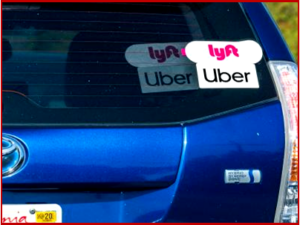
This is also consistent with public commitments that ridesharing companies have made. Now, they will actually have to solve the problem.
The California Air Resources Board has mandated that rideshare companies begin electrification of their fleets starting in 2023. This is the latest step in California’s longstanding – pre- and post-Trump – quest of meeting what are now the state’s 2030 climate goal of cutting greenhouse gas (GHG) emissions 40% below 1990 levels and achieving carbon neutrality by 2045. This aids implementation of Governor Newsom’s Zero Emission Vehicle Executive Order (N-79-20) , aka the state’s air quality goals.
The transportation sector accounts for almost 50% of GHG emissions in California and is responsible for the majority of the state’s air pollution. Though rideshare vehicles are a relatively small portion of California’s vehicle fleet, they often travel many miles beyond the average of other vehicles, so electrifying them can provide significant environmental benefits.
The Clean Miles Standard aligns with Governor Newsom’s Executive Order ending sales of internal combustion passenger vehicles by 2035. SB 1014 (2018) – the Clean Miles Standard and Incentive Program – requires CARB and the California Public Utilities Commission (CPUC) to develop and implement new requirements for rideshare companies to quickly curb their GHG emissions as new mobility options rapidly become available.
The Trump administration of course tried to cancel states rights and citizens’ ability to govern their communities. California led a lawsuit last year with 22 more states and other jurisdictions challenging the Trump Administration’s plan to roll back vehicle emissions standards.
Since these emission rules were enacted almost a decade ago, they have reduced air pollution and protected the air we breathe. Then as now the Federal swamp along the banks of the Potomac is over-populated by big money special interests and giving off fetid emissions that need to be cleaned up through more regulation.
The California Air Resources Board helped develop the original 2012 rules and was led in this case by the California Attorney General. Trump is among the shrinking number of global warming deniers, a position – as usual – that has no basis in fact, but is funded by lobbying groups working for those who benefit from exploiting and increasing the use of carbon-based fossil fuels. The 2012 rules would have had automakers increase the average fuel economy of cars and trucks to ~54 miles per gallon by 2025. The new Trump mini-standards require automakers to only improve their average fleet-wide fuel economy to 40 miles per gallon.
The Clean Miles Standard, per SB 1014, requires that rideshare companies operating in California meet annual GHG and electrification targets. This aligns ridesharing companies with other corporate fleet requirements. By 2030, the regulation would require that rideshare companies achieve a level of zero greenhouse gas emissions and to ensure 90% of their vehicle miles are fully electric.
“This move is yet another piece of the comprehensive program California has developed to protect public health from harmful emissions,” said CARB Chair Liane M. Randolph. “The transportation sector is responsible for nearly half of California’s greenhouse gas emissions, the vast majority of which come from light-duty vehicles. This action will help provide certainty to the state’s climate efforts and improve air quality in our most disadvantaged communities.”
The GHG target can be met variously, including by increasing electric miles beyond the 90% electric miles target, reducing deadhead miles – miles driven without a passenger – or increasing the number of passengers per trip by pooling. Rideshare companies can also earn optional GHG credits by investing in sidewalk and bike lane infrastructure that support active transportation and connecting to transit through integrated trip booking apps.
This is also consistent with public commitments that ridesharing companies such as Uber and Lyft have made to transition to zero-emission vehicles by 2030, as well as state and federal incentive programs available to support the transition to zero-emission vehicles. Governor Newsom’s May revision of the state budget provides hundreds of millions of additional dollars for the state programs.
Drivers who lease or buy an EV may apply for the full range of California clean car incentives rebates such as the Clean Vehicle Rebate Project, the Clean Cars 4 All program and the Clean Fuels Reward, as well as financial incentives from their local utilities and a federal tax credit.
See AutoInformed
- Draining the Swamp – California, 22 States Sue to Stop Trump Emissions Rollback Citing Economic, Health and Climate Goals
- 30 Senators Asking Automakers to Join California Fuel-Economy Agreement in Defiance of Trump’s EPA
- California, Automakers Defying Trump Agree on Emissions
- California Officials Testify Against Trump’s Decree to Slash Cleaner Car Standards and Increase CO2 Emissions
- Record year for California Climate Investments
- California Requires Electric Trucks by 2045
- California to Subsidize 51 Shell Hydrogen Sites
- CARB, 21 Attorneys Generals, Oakland, Los Angeles, San Francisco, New York Demand Trump Stop Clean Air Act Gutting
- US DOT and EPA Want to Slash Fuel Economy Standards. Trump Administration Proposal Has Many Critics
- CARB Defies Trump on Vehicle Emission Standards


California Air Resources Board today 5/24/21 announced the appointment of seven new members to its Environmental Justice Advisory Committee (EJAC). The committee is comprised of representatives from California communities most heavily impacted by air pollution, including those communities with minority or low-income populations.
The newly-appointed representatives include:
Connie Cho, Communities for a Better Environment
Dillon Delvo, Little Manila Rising
Catherine Garoupa White, Central Valley Air Quality Coalition
Thomas Helme, Valley Improvement Projects
Neena Mohan, California Environmental Justice Alliance
Sharifa Taylor, Communities for a Better Environment
Paulina Torres, Center on Race, Poverty and the Environment